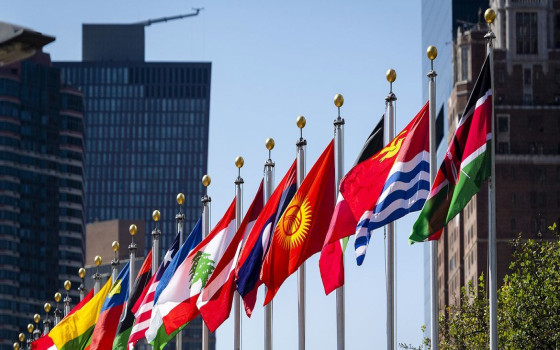
Nearly 60 countries opposed or abstained from voting at the United Nations on a resolution calling for Israel to end its “illegal presence in the occupied Palestinian territory” within 12 months

- Europe and Arabs
- Thursday , 19 September 2024 6:41 AM GMT
New York: Europe and the Arabs
By a majority of 124 members, the United Nations General Assembly adopted a resolution demanding that Israel end its "illegal presence in the occupied Palestinian territory" within 12 months, based on an advisory opinion requested by the General Assembly from the International Court of Justice regarding the legal consequences of Israel's policies and practices in Palestine.
The vote came on Wednesday evening during the tenth emergency special session of the United Nations General Assembly on Palestine. The draft resolution was submitted by several countries, including Palestine, for the first time after it obtained additional privileges under a previous resolution of the General Assembly. According to the United Nations daily news bulletin, a copy of which we received on Thursday morning,
124 members voted in favor of the resolution, 14 members opposed it, and 43 abstained.
The General Assembly resolution includes the following:
That Israel shall end without delay its illegal presence in the occupied Palestinian territory within a maximum period of 12 months from the date of “adoption of the resolution”,
That Israel shall comply without delay with all its obligations under international law, including as stipulated by the International Court of Justice, and that Israel shall, inter alia:
Withdraw all its military forces from the occupied Palestinian territory,
Ending its illegal policies and practices, including the immediate cessation of all new settlement activities, the evacuation of all settlers from the occupied Palestinian territory and the dismantling of the parts of the wall constructed by Israel,
Returning land and other immovable property, and all assets seized since the beginning of its occupation in 1967,
Allowing all Palestinians who were displaced during the occupation to return to their original places of residence,
Not impeding the Palestinian people from exercising their right to self-determination, including their right to establish an independent and sovereign State over the entire occupied Palestinian territory.
The General Assembly calls upon all States in the resolution to comply with their obligations under international law. It was decided to hold an international conference during the 79th session of the General Assembly to implement the United Nations resolutions related to the question of Palestine and the two-state solution to achieve a just, lasting and comprehensive peace in the Middle East.
The General Assembly also calls for the convening of a conference of the High Contracting Parties to the Fourth Geneva Convention relative to the Protection of Civilian Persons in Time of War, to address the necessary measures to implement the Convention in the occupied Palestinian territory, including East Jerusalem.
The resolution requests the Secretary-General to submit to the General Assembly, within 3 months, a report on the implementation of this resolution.
Positions of opposing and abstaining countries
Papua New Guinea and Argentina were among the 14 countries that opposed the Palestinian draft resolution. Papua New Guinea justified its decision by saying that the draft resolution requires Israel to make "unilateral concessions without any reciprocal steps from the other parties concerned."
Argentina attributed its vote against the resolution to several reasons, including that the adopted resolution goes beyond what was confirmed in the advisory opinion of the International Court of Justice, but it also expressed strong support for a ceasefire in the war in Gaza.
Germany, Ecuador, the UK and Kiribati were among the 43 countries that abstained from voting on the draft resolution. Germany explained that the resolution went beyond the scope of the advisory opinion on several points, and that “rather than setting unrealistic time frames, it would have been advisable to emphasize more strongly that the parties need to resolve their differences through direct talks.”
Kiribati stressed the need for a genuine bilateral approach to peace, calling for a two-state solution. Ecuador referred to what it called the resolution’s “artificial timetable” while reiterating support for the two-state solution.
The UK criticized the resolution for its lack of clarity on moving forward with a negotiated two-state solution.
US Ambassador to the UN Linda Thomas-Greenfield, who spoke at the meeting before the vote, said that adopting a “unilateral resolution that selectively interprets the essence of the ICJ opinion” does not advance progress towards a two-state solution, adding that a solution to the Israeli-Palestinian conflict must be achieved through negotiations between the parties, based on certain basic principles, including the concept of land for peace, which she said was not mentioned in the draft resolution.
It is noteworthy that the draft resolution was submitted by a number of countries, including Jordan, Bahrain, Turkey, Algeria, Djibouti, Sudan, Iraq, Oman, Qatar, Kuwait, Libya, Egypt, Morocco, Saudi Arabia, Mauritania and the State of Palestine.












No Comments Found